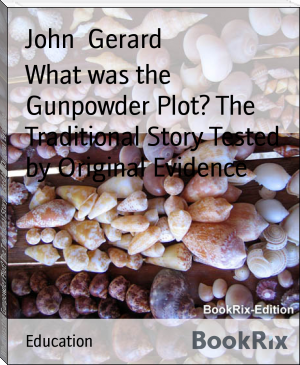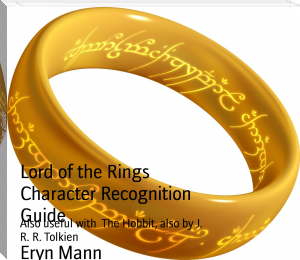What was the Gunpowder Plot? The Traditional Story Tested by Original Evidence - John Gerard (interesting novels in english txt) 📗

- Author: John Gerard
Book online «What was the Gunpowder Plot? The Traditional Story Tested by Original Evidence - John Gerard (interesting novels in english txt) 📗». Author John Gerard
The Question of Succession.
FATHER PARSONS' well-known book on this subject, written under the pseudonym of Doleman, was denounced by Sir Edward Coke as containing innumerable treasons and falsehoods. In fact, as may be seen in the work itself, it is an exhaustive and careful statement of the descent of each of the possible claimants, and of other considerations which must enter into the settlement. Sir Francis Inglefield wrote that it was necessary to take some step of this kind, to set men thinking on so important a question which would soon have to be decided, for that the anti-Catholic party had made it treason to discuss it during the queen's life, with intent to foist a successor of their own selection on the nation, when the moment should arrive, trusting to the ignorance universally prevalent as to the rights of the matter; but that such lack of information could not help the people to a sound decision. [Stonyhurst MSS., Anglia, iii. 32.]
The Spanish sympathies of Parsons and his party were afterwards made much of as evidence of their traitorous disposition. On this subject it must be noted (1) the Infanta of Spain was amongst those whose claim was urged on genealogical grounds; (2) the project was to marry her to an English nobleman. As Parsons tells us, when she married and was endowed with another estate, English Catholics ceased to think of her. [Ibid. ii. 444.] (3) Father Garnet notes that, "since the old king of Spain died [1598], there hath been no pretence ... for the Infanta, or the King [of Spain], or any of that family, but for any that should maintain Catholic religion, and principally for His Majesty" [James I.]. [Ibid. iii. n. 41.]
A remark of Parsons' on this point, which at the time was considered almost blasphemous, will seem now almost a truism, viz., that the title of particular succession in kingdoms is founded only upon the positive laws of several countries, since neither kingdoms nor monarchies are of the essence of human society, and therefore every nation has a right to establish its own kings in what manner it likes, and upon what conditions. Wherefore, as each of the other great parties in England (whom he designates as Protestants and Puritans) will look chiefly to its own political interests, and exact from the monarch of its choice pledges to secure them, it behoves Catholics, being so large a part of the nation, to take their proper share in the settlement, and therefore to study betimes the arguments on which the claims of the competitors are severally based.
APPENDIX DThe Spanish Treason.
THE history of the alleged treasonable negotiations with Spain, conducted by various persons whose names were afterwards connected with the Gunpowder Plot, appears open to the gravest doubt and suspicion. It would be out of place to discuss the question here, but two articles on the subject, by the present writer, will be found in the Month for May and June, 1896.
APPENDIX E
Site of Percy's lodging [see View, p. 56, and Plan, p. 59.]
THAT the lodging hired by Percy stood near the south-east corner of the old House of Lords (i.e. nearer to the river than that building, and adjacent to, if not adjoining, the Prince's Chamber) is shown by the following arguments.
John Shepherd, servant to Whynniard, gave evidence as to having on a certain occasion seen from the river "a boat lye cloase to the pale of Sir Thomas Parreys garden, and men going to and from the water through the back door that leadeth into Mr. Percy his lodging." [Gunpowder Plot Book, 40, part 2.] Faukes, in his examination of November 5th, 1605, speaks of "the windowe in his chamber neere the parliament house towards the water side." It is said that when digging their mine the conspirators were troubled by the influx of water from the river, which would be impossible if they were working at the opposite side of the Parliament House.[It has always been understood that Percy's house stood at the south end of the House of Lords, but Smith (Antiquities of Westminster, p. 39) places it to the south-west instead of the south-east, saying that it stood on the site of what was afterwards the Ordnance Office.]
APPENDIX F
Enrolment of Conspirators.
The evidence on this point is most contradictory.
The Indictment, on the trial of the conspirators, mentions the following dates.May 20th, 1604. [Besides Garnet, Greenway, Gerard, "and other Jesuits,"] there met together T. Winter, Faukes, Keyes, Bates, Catesby, Percy, the two Wrights, and Tresham, by whom the Plot was approved and undertaken.
March 31st, 1605, R. Winter, Grant, and Rokewood were enlisted.
[No mention is made of Digby, who was separately arraigned, nor in his arraignment is any date specified.]
According to Faukes' confession of November 17th, 1605, Percy, Catesby, T. Winter, J. Wright, and himself were the first associates. Soon afterwards C. Wright was added. After Christmas, Keyes was initiated and received the oath. At a later period, Digby, Rokewood, Tresham, Grant, and R. Winter were brought in. Bates is not mentioned.[In this document the names of Keyes and R. Winter have been interchanged, in Cecil's writing, and thus it was printed: the latter being made to appear as an earlier confederate.]
According to T. Winter's declaration of November 23rd, 1605, Catesby, J. Wright, and himself were the first associates, Percy and Faukes being presently added. Keyes was enlisted before Michaelmas, C. Wright after Christmas, Digby at a later period, and Tresham "last of all." No others are mentioned. Keyes--November 30th, 1605--says that he was inducted a little before Midsummer, 1604. R. Winter and Grant (January 17th, 1605-6) fix January, 1604-5, for their introduction to the conspiracy, and Bates (December 4th, 1605) gives the preceding December for his. Neither date agrees with that of the indictment in support of which these confessions were cited. There is, of course, no evidence of any kind to show that Father Garnet and the "other Jesuits" ever had any conference with the conspirators, nor was such a charge urged on his trial. Sir Everard Digby's case is exceptionally puzzling. All the evidence represents him as having been initiated late in September, or early in October, 1605. Among the Hatfield MSS., however, there is a letter addressed to Sir Everard, by one G. D., and dated June 11th, 1605, which treats ostensibly of a hunt for "the otter that infesteth your brooks," to be undertaken when the hay has been cut, but has been endorsed by Cecil himself, "Letter written to Sir Everard Digby--Powder Treason;" the minister thus attributing to him a knowledge of the Plot, more than three months before it was ever alleged that he heard of it. APPENDIX G.
Henry Wright the Informer.
Letter to Sir T. Challoner, April, 1604. [Gunpowder Plot Book, n. 236.]Good Sir Thomas, I am as eager for setting of the lodgings as you can be, and in truth whereas we desired but twenty, the discoverer had set and (if we accept it) can set above three score, but I told him that the State would take it for good service if he set twenty of the most principal Jesuits and seminary priests, and therewithal I gave him thirteen or fourteen names picked out of his own notes, among the which five of them were sworn to the secresy. He saith absolutely that by God's grace he will do it ere long, but he stayeth some few days purposely for the coming to town of Tesmond [Greenway] and Kempe, two principals; their lodgings are prepared, and they will be here, as he saith for certain, within these two days. For the treason, Davies neither hath nor will unfold himself for the discovery of it till he hath his pardon for it under seal, as I told you, which is now in great forwardness, and ready to be sealed so that you shall know all.... Your worship's most devoted,
HEN. WRIGHT.
[A pardon to Joseph Davies for all treasons and other offences appears on the Pardon Roll, April 25th, 1605, thus supplying the approximate date of the above letter.]
Application to the King. [Gunpowder Plot Book, n. 237.]"If it may please your Majesty, can you remember that the Lord Chief Justice Popham and Sir Thomas Challoner, Kt., had a hand in the discovery of the practices of the Jesuits in the powder, and did from time reveal the same to your Majesty, for two years' space almost





Comments (0)